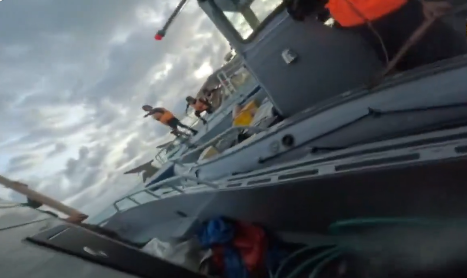China is the bully of Asia, and now daily harasses all of their neighbors south of the country. They claim waters thousands of miles from the mainland as their own, in one huge territory grab. China needs a lot of ‘living room’ as the Nazis once claimed to need.
This week, tensions escalated dramatically in the South China Sea when the Philippines accused China’s Coast Guard of a “brutal assault” involving bladed weapons during a confrontation near the Second Thomas Shoal in the disputed Spratly Islands. The incident, captured in military footage released by the Philippines, shows Chinese personnel wielding axes and other sharp objects, attacking Filipino soldiers and damaging their rubber boat. This clash, which occurred during a Philippine resupply mission to a World War II-era ship asserting Manila’s territorial claims, marks a significant uptick in aggression in this resource-rich and strategically crucial waterway.
WATCH: Chinese sailors harass Philippine ships in the South China Sea
“Only pirates do this. Only pirates board, steal, and destroy ships, equipment, and belongings.” -Gen. Romeo Brawner Jr., Philippine Army pic.twitter.com/BGRoJYvSdE
— Select Committee on the Chinese Communist Party (@committeeonccp) June 20, 2024
The use of such direct and aggressive tactics by the Chinese Coast Guard is seen by analysts as a calculated move to test the reactions of the Philippines and its primary defense ally, the United States. The Philippines has decried these actions as overt acts of aggression, likening them to piracy. High-ranking Philippine military officials reported that Chinese personnel not only attacked but also looted equipment and personal belongings from the Filipino forces.
The confrontation comes amid new Chinese legislation authorizing its coast guard to seize foreign ships and detain crews without trial, further intensifying the stakes. This incident is the first major test of this law and occurs as Philippine President Ferdinand “Bongbong” Marcos Jr. seeks to strengthen ties with the U.S., which has reiterated its commitment to defend the Philippines under their mutual defense treaty.
The Philippines blamed China when a Chinese ship reportedly collided with a Filipino supply ship near the Spratly Islands on June 17. According to the Chinese coast guard, the Filipino ship entered the waters, disregarding Chinese directives to keep out. A 2016 international… pic.twitter.com/u4bws2OUuS
— China in Focus – NTD (@ChinaInFocusNTD) June 19, 2024
At the international level, China continues to assert “indisputable sovereignty” over nearly all of the South China Sea, disregarding competing claims from the Philippines and other nations, as well as a 2016 Hague ruling favoring Manila. The ongoing disputes and China’s aggressive enforcement of its claims have raised concerns about regional stability and the potential for these skirmishes to trigger wider international conflict.
Armed Forces of the Philippines @TeamAFP shared footage of Chinese Communist Party paramilitary forces using bladed weapons to attack Philippines servicemen in the South China Sea pic.twitter.com/xPYxhIfgjj
— Drew Pavlou 🇦🇺🇺🇦🇹🇼 (@DrewPavlou) June 19, 2024
This latest episode not only highlights the dangers of the territorial disputes in the South China Sea but also puts the U.S.-Philippines alliance under scrutiny, as both Manila and Washington consider their next steps in response to China’s provocations.
Major Points
- The Philippines has accused China’s Coast Guard of a violent assault involving bladed weapons during a confrontation in the South China Sea.
- The incident occurred near the Second Thomas Shoal in the Spratly Islands, where Filipino personnel were on a resupply mission.
- Footage from the clash shows Chinese forces using axes and other sharp objects, damaging a Philippine rubber boat and seizing equipment.
- This aggression marks a significant escalation in the ongoing territorial disputes in the region, challenging both Philippine sovereignty and international maritime law.
- The confrontation tests the U.S.-Philippines defense treaty, with potential implications for regional stability and U.S. commitments in the Asia-Pacific.
Susan Guglielmo – Reprinted with permission of Whatfinger News



